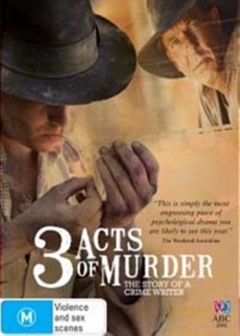
THREE ACTS OF MURDER
Australia, 2008, 110 minutes,Colour.
Robert Menzies, Luke Ford.
Directed by Rowan Woods.
Three Acts of Murder is a story of Australian author, Arthur Upfield. He was the creator of the Aboriginal detective, Napoleon Bonaparte. Upfield said that Napoleon Bonaparte was a character who combined the insights and intuitions of Aboriginal people as well as the rational deduction of the west.
The film is set in Western Australia, Upfield having left his wife and son and living on properties in the west, dealing with camel and trade. While in the west, he encounters a young man, Snowy (Luke Ford) and befriends him. As a hobby, he is planning his murder mystery with Napoleon Bonaparte. However, he discusses his plans and ideas with various people on the properties.
When he returns to Perth, he tries to reunite with his wife and son, but finds it very difficult. When Snowy is arrested and charged with a number of murders, he feels partly responsible but does not want to take responsibility for the methods that Snowy used, imitating the plots that were discussed. Snowy was found guilty and hanged, protesting his innocence. Upfield went on to write many Napoleon Bonaparte novels.
Robert Menzies is very good as the tormented author, writing letters to his mother from the Outback but not communicating with his wife and son, trying to settle back into Perth – and his wife making heroic efforts, finally organising a bed and breakfast house and giving him an office. The film is an interesting insight into an author, with little background, compelled to write, getting good reviews, praised by the English press, trying to make a success of himself in Western Australia. Luke Ford is also very good as Snowy.
The film was directed by Rowan Woods (The Boys as well as the American feature, Winged Creatures, with Guy Pearce and Kate Beckinsale).
1. The title, the drama, the three acts, the three cases of murder?
2. Audience knowledge of Arthur Upfield, as a person, as an author, his reputation, his books?
3. Upfield and his comments on the vision of the Aborigines and the deduction capacities of westerners? His plots, ideas, setting up cases, the issue of evidence, clues – and his skill with these elements rather than with characters?
4. Upfield and his writing, the time, the place, the lack of paper, contact with the publishers, the copies arriving, the reviews, the British and their favourable reviews? Perth, sales, his dependence on reviews, his reputation, interviewing people, drawing their attention to his success, going to the bookshops? The final information about his success?
5. Murchison, Western Australia, the desert, the camels, the homesteads, the prospectors, the camps? The atmosphere of the rabbit-proof fence? The contrast with Perth, the city, the suburbs, outside Perth? Authentic atmosphere? The musical score and the sense of period?
6. The film taking place from 1928 to 1932? The look, décor, costumes, Australiana, the Depression? The well-dressed people, the bushies? Poverty and hardship? The feel of the times?
7. The opening, the deaths, the murders, the three acts of murder, the desert, violence, the later re-enactment and Snowy’s involvement in each of the murders? His greed, jealousy, callousness?
8. Upfield and his age, his appearance, experience, his marriage, his family, the neglect, writing to his mother, not to his wife? The simple life in the Outback? George and the exchange of ideas? Snowy’s arrival, friendship? The meals, yarning, drinking? Travellers passing by? The bush people, the wandering? Characters, not reading character well? Upfield’s lack of ability with characters?
9. Snowy, his appearance, age, bright personality, his arrival, work, the stories about his father? The later information and the truth about him, his building up a false character? His jobs, Sarah and her family, listening to Upfield, saying he had no imagination yet following through? His jealousy of Ryan and his new assistant? The singing? Sarah and the sexual relationship, her dependence on him, his harsh treatment of her? His envy, the guitar, the killings? The poison and his following Upfield’s story, the evidence, talking about the bones, the accordion? His showing off with the truck, jobs and delivery, his murder at the fence, motivation?
10. The police, the investigator, finding Snowy, Snowy in prison, the interrogations, the inspector and his discussions with Upfield?
11. Upfield at the trial, his wife, the interviews, the knowledge of the plots, his declaration of friendship for Snowy, the issue of excuses and responsibility?
12. Upfield and his son, his awkward relationship with him, his love for him yet his treatment of him, wanting silence and isolation? His wife and her devotion? The hard life? Her not knowing what Upfield was doing for so many years? Long-suffering? Her treatment of Upfield and her kindness? Getting the bed and breakfast, the room for work, getting an office for Upfield, providing the opportunity for him to write his novels?
13. The trial, the court, the judge, the press, the inspector? Interrogations, witness, Upfield’s testimony? The verdict and the sentence?
14. The final credits and the information as to what happened subsequently?